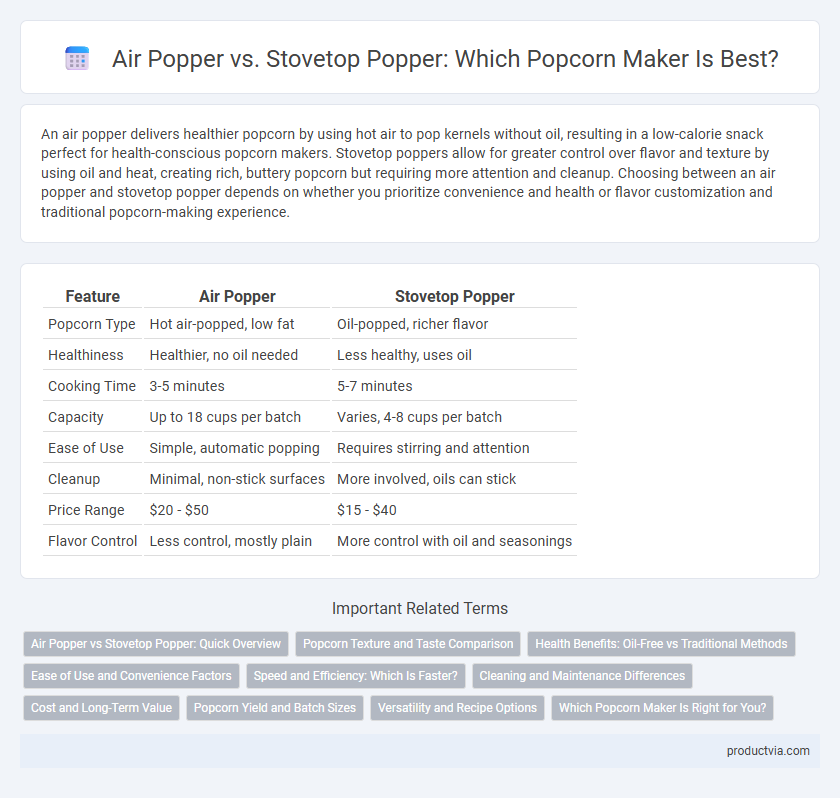An air popper delivers healthier popcorn by using hot air to pop kernels without oil, resulting in a low-calorie snack perfect for health-conscious popcorn makers. Stovetop poppers allow for greater control over flavor and texture by using oil and heat, creating rich, buttery popcorn but requiring more attention and cleanup. Choosing between an air popper and stovetop popper depends on whether you prioritize convenience and health or flavor customization and traditional popcorn-making experience.
Table of Comparison
| Feature | Air Popper | Stovetop Popper |
|---|---|---|
| Popcorn Type | Hot air-popped, low fat | Oil-popped, richer flavor |
| Healthiness | Healthier, no oil needed | Less healthy, uses oil |
| Cooking Time | 3-5 minutes | 5-7 minutes |
| Capacity | Up to 18 cups per batch | Varies, 4-8 cups per batch |
| Ease of Use | Simple, automatic popping | Requires stirring and attention |
| Cleanup | Minimal, non-stick surfaces | More involved, oils can stick |
| Price Range | $20 - $50 | $15 - $40 |
| Flavor Control | Less control, mostly plain | More control with oil and seasonings |
Air Popper vs Stovetop Popper: Quick Overview
An air popper uses hot air circulation to pop kernels without oil, resulting in lower-calorie, healthier popcorn, while stovetop poppers require oil and manual stirring to prevent burning. Air poppers offer convenience and speed, typically popping a batch in 2-4 minutes, whereas stovetop methods take 5-7 minutes and allow for customizable seasoning during cooking. Both methods yield fresh popcorn, but air poppers emphasize health and ease, and stovetop poppers cater to flavor variety and traditional texture.
Popcorn Texture and Taste Comparison
Air poppers produce popcorn with a light, fluffy texture and a clean, natural taste since they use hot air instead of oil, resulting in a lower-calorie snack. Stovetop poppers yield popcorn with a richer flavor and crunchier texture due to the use of oil, which enhances the overall taste and provides a slightly greasy but satisfying mouthfeel. Texture preferences often depend on personal taste, with air-popped favored for health-conscious consumers and stovetop-popped preferred by those seeking a classic, buttery flavor.
Health Benefits: Oil-Free vs Traditional Methods
Air poppers produce popcorn without oil, significantly reducing calorie and fat content compared to traditional stovetop methods that require oil for popping. This oil-free process helps maintain a lower sodium and saturated fat intake, promoting heart health and weight management. Stovetop poppers, while offering richer flavor, often involve added oils or butter that increase calorie density and potential cholesterol levels.
Ease of Use and Convenience Factors
An air popper offers unmatched ease of use with a one-button operation and no need for oil, making it a convenient choice for quick, healthy popcorn. In contrast, a stovetop popper requires manual stirring and careful temperature control, which can be less convenient but allows more flavor customization. The air popper's hands-free design and rapid popping time provide superior convenience for busy users seeking simplicity.
Speed and Efficiency: Which Is Faster?
Air poppers typically produce popcorn faster, heating kernels evenly with hot air that pops corn in about 2-4 minutes, whereas stovetop poppers require preheating and manual shaking, often taking 5-7 minutes. Air poppers offer higher efficiency by minimizing oil use and reducing the risk of burnt kernels, while stovetop models may waste time adjusting heat and stirring. For speed and consistent popping, air poppers outperform stovetop poppers, making them ideal for quick, efficient popcorn preparation.
Cleaning and Maintenance Differences
Air poppers feature non-stick interiors and detachable components, making cleaning quick and convenient with just a damp cloth or mild detergent. Stovetop poppers often require more effort due to oil residue and can have intricate parts that need thorough scrubbing and drying to prevent rust. Regular maintenance of stovetop models includes seasoning the pan to preserve the surface, whereas air poppers demand minimal upkeep to maintain optimal performance.
Cost and Long-Term Value
Air poppers typically cost between $20 to $50 and provide a healthier, oil-free pop, making them energy-efficient and low maintenance over time. Stovetop poppers, priced around $15 to $40, offer versatile use and durability but require oil and more hands-on effort, which can increase ongoing costs. For long-term value, air poppers reduce cooking time and mess, while stovetop models save initial expense and allow flavor customization with oils and seasonings.
Popcorn Yield and Batch Sizes
Air poppers typically produce larger popcorn yields per batch due to their rapid hot air circulation, often popping up to 18 cups of popcorn in a single cycle. Stovetop poppers generally yield smaller batches, around 6 to 8 cups, but allow for more control over heat and popping time, which can affect kernel expansion and texture. Choosing an air popper benefits those seeking higher volume and convenience, while stovetop poppers suit users prioritizing batch customization and traditional cooking methods.
Versatility and Recipe Options
Air poppers excel in health-conscious versatility by using hot air, allowing for oil-free popcorn ideal for low-calorie snacks, while stovetop poppers offer broader recipe options with the ability to use various oils, butter, and seasonings for richer flavors and customized coatings. Stovetop poppers accommodate diverse cooking techniques like caramelizing sugar or adding spices during popping, enhancing culinary creativity beyond the simple, fast air-popped method. Both devices serve different versatility needs, with air poppers prioritizing convenience and stovetop poppers supporting experimental and gourmet popcorn recipes.
Which Popcorn Maker Is Right for You?
An air popper delivers healthier popcorn by using hot air to pop kernels without oil, making it ideal for health-conscious users seeking low-calorie snacks. A stovetop popper offers greater control over flavor and texture by allowing the addition of oil and seasonings during popping, preferred by those who enjoy customizing their popcorn experience. Choosing the right popcorn maker depends on whether you prioritize convenience and health or flavor versatility and traditional preparation.
Air Popper vs Stovetop Popper for Popcorn Infographic

 productvia.com
productvia.com